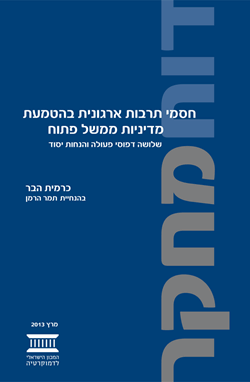Aspects of Organizational Culture that Impede the Implementation of Open Government Policy
Research Report
- Written By: Karmit Haber
- Supervisor: Prof. Tamar Hermann
- Publication Date:
- Cover Type: Online Booklet
- Number Of Pages: 39 Pages
Open government seeks to advance accessibility to information, transparency, and public participation in government. What challenges are Israeli officials and politicians facing in implementing such policy? Find out in this research report.
The research report presented here focuses on aspects of organizational culture that impede the promotion of open government policy. The following question stands at the center of this report: What challenges are government officials and politicians facing in the implementation of an open government policy, which seeks to advance principles of accessibility to information, transparency, and public participation?
The detailed response to this question outlined here is based on relevant professional literature; an analysis of articles published in the press; information obtained during conferences; and conversations and in-depth interviews with six key individuals who work in government organizations and offices that are relevant to the promotion of open government policy. The decision was made to conduct interviews in order to provide an understanding of how internal players perceive, explain, and experience the organizational obstacles encountered in promoting processes of open government policy.
This document identifies three primary impediments to implementing principles of open government policy:
- Territorialism: This refers to a particular structure of bureaucratic organizations that makes it difficult to advance coordination and cooperation between branches of government.
- How information is managed and stored: Five issues stand in the way of efforts to promote transparency and accessibility of government information:
- Bureaucratic "confidentiality" of information, i.e., extensive forms, complex processes, and procedures, that shrouds the bureaucratic process in secrecy and fundamentally contradicts a move toward transparency
- Distinguishing between different types of information, i.e., the specific characteristics of tacit and contextual knowledge as compared to standard and codified knowledge , and the difficulties involved in managing and organizing this information
- The difficult nature of transparency
- Dated technologies and inconsistent digitization
- Government fear regarding the measuring of its output and performance.
- Perception of public participation as a "disturbance" or "noise in the system": This refers to the fear of government workers of "incorrect" interpretation, public criticism, and loss of efficiency, combined with a fear of low quality input by citizens in publicly shared initiatives. This perception slows the advancement of the principle of public participation in decision-making processes.

